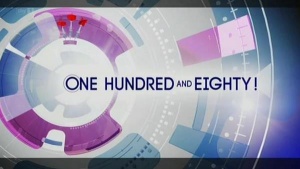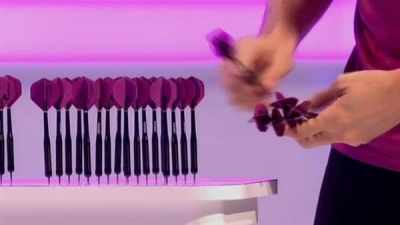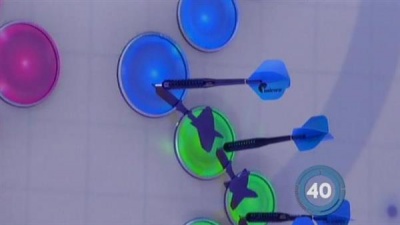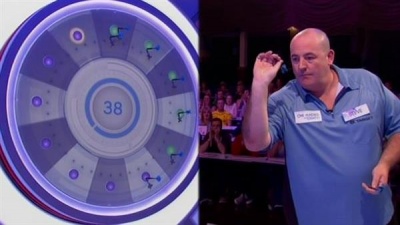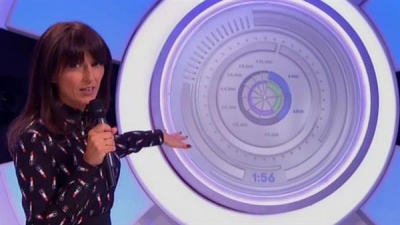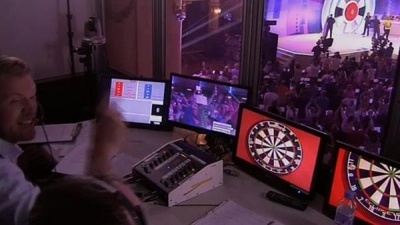One Hundred and Eighty
Contents |
Host
Davina McCall and Freddie Flintoff
Co-hosts
Commentary: Freddie Flintoff and Rod Studd
Referee: Russ Bray
Broadcast
ITV Studios for Sky 1, 15 September to 22 October 2015 (8 episodes in 1 series)
Synopsis
What's the most important thing on any darts quiz? Darts. Lots of them.
They're handled by star darts players. The first business on the show is how great these darts players are. Throwing three darts each, they take turns to try and hit double-1, then double-2, and so on. Whatever they've hit after two minutes becomes the jackpot prize at the end of the game.
Remember how we said that the first business was how great these darts players were? We lied: the first business is to introduce them, through a film listing prizes like they're going out of fashion. The civilian players also get a film about their life, introducing them to us, and bringing in two friends who will help them answer questions.
Ten minutes into the show, everyone's walked on, and we're ready to quiz. In The Race, Davina asks 45 seconds of buzzer questions for the quizzers. One light on a zig-zag pattern is lit for each correct answer. After the civilians have done their bit, their professional colleagues have 45 seconds each at the oche. Whichever team can complete the board faster, or get higher up the board, wins the round.
Later, we meet The Zone. A dartboard, containing four triangular zones. They're worth 30, 50, 80, and 100 points; as the value increases, the size shrinks. Davina asks a question on the buzzers, a right answer lights the big 30 point zone and the team has a chance to throw, or take a further question. "Question or throw", the approximation to a catchphrase. A right answer lights the next zone up, a wrong answer passes control to the opposition.
Eventually, the team in control opts to throw. The team captain (the one who made the film earlier) throws three darts, hoping to hit the zone and bank the points. First team to reduce their score from 180 to nothing (or less) wins the round.
Stop the Clock is a time-trial round. One team is to answer five questions. The other team's amateur thrower has that length of time to go round the board and hit some circular targets. There are twelve targets to hit, each a bit larger than the outer bull. Start at the top, go clockwise around, better performance wins.
After each of these rounds is a pro leg, played by the professional player on each team. A normal 501-up leg, with bonuses of £500 for hitting 180 in a visit (and £1000 for a 9-dart finish). The players keep this bonus money whatever happens.
The night's winner is decided in a doubles leg, the Doubles Decider. Again, it's 501-up, except each round won earlier is worth 10 points off the score here. Professionals and amateurs alternate, and the first team to reach zero (on a double) wins the show.
All of this means the last 50 minutes does almost nothing to help find the winner. At best, a team can take a one-dart head start in the leg. It's a small problem in the format, and doesn't really hurt the show.
The winners in this doubles leg go through to The Final Throw. Here, the cash jackpot won in the opening five minutes is split into various fractions from 1/40th to one-half, and the full amount. Nine segments, nine areas to hit to win prizes, and two minutes to win them.
The professional throws first, aiming at small targets in the treble ring. Once the pro has finished, or the amateur stops them, the amateur throws at larger targets in the doubles ring. Only the targets that both players hit can be won. The players are only allowed to use three darts, and must retrieve their arrows after throwing them.
We found One Hundred and Eighty to be very similar to televised darts. We're never too far from a round at the oche, and the quiz rounds are kept to a minimum, never more than a minute long. A significant prize for the winner, well into the thousands. A tense finish: can the player land their darts in the small final areas? Will the amateur stop the professional?
And all held together by Davina McCall, working to her usual high standard. Davina's not for everyone, if you don't like her other shows then you'll not like this one.
This show is not Bullseye. It's darts-with-a-bit-of-quiz, putting the darts first.
But what of co-host Freddie Flintoff? While all the action is on-stage, Freddie is relegated to the commentary box at the back of the hall.
Inventor
Credited to the Development team: Sam Crack, Peter Howell, Joe Mace. Games designer was Peter Gordon.
Title Music
Composer: Neil Myers
Trivia
Had the credit "With special thanks to the Professional Darts Corporation". Sky's relationship with the breakaway PDC stretched back over 20 years.
Some episodes were also shown on Sky's premium sports channels.
For a channel for which Bullseye was a staple, and which happens to be owned by Sky, it was surprising that Challenge only got around to repeating the show in July 2020, two days after Epic Gameshow did Bullseye.

